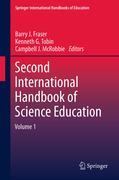
Second international handbook of science education
Fraser, Barry J.
Tobin, Kenneth
McRobbie, Campbell J.
INDICE: PART ONE. Preface. Section 1: Sociocultural Perspectives and Urban Education. KENNETH TOBIN: 1.1 Sociocultural Perspectives on Science Education.STACY OLITSKY & CATHERINE MILNE: 1.2 Understanding Engagement in Science Education: The Psychological and the Social. YEW-JIN LEE: 1.3 Identity-Based Research in Science Education. JRÈNE RAHM: 1.4 Diverse Urban Youth’s Learning of Science Outside School in University Outreach and Community Science Programs. CHRISTOPHER EMDIN: 1.5 Reality Pedagogy and Urban Science Education: Toward a Comprehensive Understanding of the Urban Science Classroom. DONNA KING & STEPHENM. RITCHIE: 1.6 Learning Science Through Real-World Contexts. ROWHEA ELMESKY:1.7 Collaborative Research Models for Transforming Teaching and Learning Experiences.- MARIA VARELAS, JUSTINE M. KANE, ELI TUCKER-RAYMOND & CHRISTINE C. PAPPAS: 1.8 Science Learning in Urban Elementary School Classrooms: Liberatory Education and Issues of Access, Participation and Achievement. Section 2: Learning and Conceptual Change. REINDERS DUIT & DAVID F. TREAGUST: 2.1 How Can Conceptual Change Contribute to Theory and Practice in Science Education?. STELLA VOSNIADOU: 2.2 Reframing the Classical Approach to Conceptual Change: Preconceptions, Misconceptions and Synthetic Models. GREGORY P. THOMAS: 2.3 Metacognition in Science Education: Past, Present and Future Considerations.- BRUCE WALDRIP & VAUGHAN PRAIN: 2.4 Learning From and Through Representations in Science.LYNN STEPHENS & JOHN J. CLEMENT: 2.5 The Role of Thought Experiments in Science and Science Learning. COLETTE MURPHY: 2.6 Vygotsky and Primary Science. AVIHOFSTEIN & PER M. KIND: 2.7 Learning In and From Science Laboratories: URI ZOLLER & TAMI LEVY NAHUM: 2.8 From Teaching to KNOW to Learning to THINK in Science Education. EDUARDO F. MORTIMER, PHIL SCOTT & CHARBEL N. EL-HANI: 2.9 The Heterogeneity of Discourse in Science Classrooms: The Conceptual Profile Approach. KNUT NEUMANN, ALEXANDER KAUERTZ & HANS E. FISCHER: 2.10 Quality of Instruction in Science Education. FANG-YING YANG & CHIN-CHUNG TSAI: 2.11 Personal Epistemology and Science Learning: A Review of Empirical Studies. GREGORY J. KELLY, SCOTT MCDONALD & PER-OLOF WICKMAN: 2.12 Science Learning and Epistemology. Section 3: Teacher Education and Professional Development. JOHN WALLACE & JOHNLOUGHRAN: 3.1 Science Teacher Learning. SHIRLEY SIMON & SANDRA CAMPBELL: 3.2 Teacher Learning and Professional Development in Science Education. PAULINE W.U. CHINN: 3.3 Developing Teachers’ Place-Based and Culture-Based Pedagogical Content Knowledge and Agency. NORMAN G. LEDERMAN & JUDITH S. LEDERMAN: 3.4 Nature of Scientific Knowledge and Scientific Inquiry: Building Instructional Capacity Through Professional Development. THOMAS KOBALLA, JR. & LESLIE U. BRADBURY: 3.5 Mentoring in Support of Reform-Based Science Teaching. PETER C. TAYLOR,ELISABETH SETTELMAIER & BAL CHANDRA LUITEL: 3.6 Multi-Paradigmatic Transformative Research as/
- ISBN: 978-1-4020-9040-0
- Editorial: Springer Netherlands
- Encuadernacion: Cartoné
- Páginas: 1400
- Fecha Publicación: 30/11/2011
- Nº Volúmenes: 1
- Idioma: Inglés
